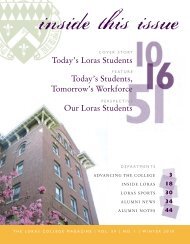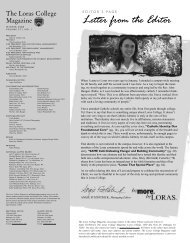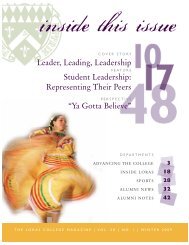THE LORAS COLLEGE MAGAZINE | VOL. 59 | NO. 1 | WINTER 2010
THE LORAS COLLEGE MAGAZINE | VOL. 59 | NO. 1 | WINTER 2010
THE LORAS COLLEGE MAGAZINE | VOL. 59 | NO. 1 | WINTER 2010
You also want an ePaper? Increase the reach of your titles
YUMPU automatically turns print PDFs into web optimized ePapers that Google loves.
Campus News | Spring 2011<br />
World Food Prize Expert<br />
Inspires Students BY CLARE HORST (’11)<br />
From growing up in a mud-floor,<br />
thatched hut in rural Ethiopia to being<br />
named winner of the 2009 World Food<br />
Prize, Gebisa Ejeta’s, Ph.D., story is<br />
inspiring. A distinguished professor,<br />
plant breeder and geneticist at Purdue<br />
University, Ejeta received the World<br />
Food Prize honor for his monumental<br />
contributions in the production of<br />
sorghum, one of the world’s five principal<br />
cereal grains. This grain has dramatically<br />
enhanced the food supply of hundreds<br />
of millions of people in sub-<br />
Saharan Africa.<br />
Ejeta attended Jimma Agricultural and<br />
Technical School, which had been established<br />
by Oklahoma State University<br />
under the U.S. Government’s Point Four<br />
Program. After graduating with distinction,<br />
he entered Alemaya College in<br />
eastern Ethiopia. He received his bachelor’s<br />
degree in plant science in 1973 and<br />
later become a graduate student at<br />
Purdue University, where he earned his<br />
doctorate.<br />
Gebisa Ejeta, Ph.D., visiting with guests after his<br />
lecture at Loras College.<br />
{ 24 }<br />
On Oct. 12, <strong>2010</strong>, Ejeta presented a<br />
lecture at Loras College as part of the<br />
World Food Prize Laureate Lecture<br />
Series. His visit was inspired by a global<br />
issues course taught in the <strong>2010</strong> spring<br />
semester by Jenna Lea, instructor of<br />
political science. “I challenged the class<br />
to break into groups and plan a project<br />
on campus to bring awareness to a global<br />
issue and explore how these issues<br />
have local relevance,” explained<br />
Lea. “One of the groups was interested<br />
in food and sustainability issues.” Lea<br />
and her students discovered the World<br />
Food Prize Foundation and began work<br />
to bring a speaker to the college.<br />
Ejeta’s visit was made possible with the<br />
help of Loras College alumnus, Former<br />
Ambassador Kenneth M. Quinn (’64),<br />
who is now president of The World<br />
Food Prize Foundation. After graduating<br />
from Loras College with a degree in<br />
political science, Quinn began a distinguished<br />
career working first as a rural<br />
development officer for the Foreign<br />
Service and later as the U.S.<br />
Government’s senior district advisor in<br />
Vietnam. In addition to working around<br />
the world with the Foreign Service,<br />
Quinn was on the National Security<br />
Council staff at the White House and<br />
served as ambassador to Cambodia. He<br />
retired from the state department in<br />
1999. Quinn began his career as president<br />
of the World Food Prize in 2000,<br />
working alongside Nobel Peace Prize<br />
Laureate Norman Borlaug, Ph.D.<br />
“[Quinn] actually approached Ejeta personally<br />
to see if he would be interested<br />
in coming to speak at Loras,” explained<br />
Lea. “The annual WFP laureate week in<br />
Des Moines is a very tightly scheduled<br />
week for the former laureates and we<br />
were initially concerned there would be<br />
timing difficulties. We were quite fortunate<br />
to have Dr. Ejeta on campus.”<br />
In his address to the campus community,<br />
Ejeta brought to light larger social issues<br />
concerning poverty, development and<br />
sustainability as well. “Ejeta did a great<br />
job showing how the trends in both population<br />
growth and food production<br />
could lead to a worsening global food<br />
crisis in the decades ahead unless we<br />
find ways to dramatically boost the<br />
world’s food supply,” said David<br />
Cochran, Ph.D., professor of political<br />
science. “His was an inspiring story<br />
about how a vocation in scientific<br />
research can do a great deal of humanitarian<br />
good. Ejeta both raised awareness<br />
of a critical global issue while also<br />
inspiring students with his compelling<br />
personal story.”<br />
The World Food Prize was conceived by<br />
Norman E. Borlaug, Ph.D., recipient of<br />
the 1970 Nobel Peace Prize. Since 1986,<br />
The World Food Prize has honored outstanding<br />
individuals who have made<br />
vital contributions to improving the<br />
quality, quantity or availability of food<br />
throughout the world. In 1990, Des<br />
Moines businessman and philanthropist<br />
John Ruan assumed sponsorship of The<br />
Prize and established The World Food<br />
Prize Foundation, located in Des<br />
Moines, Iowa. Since its inception The<br />
World Food Prize has been awarded to<br />
individuals from Bangladesh, Brazil,<br />
China, Cuba, Denmark, Ethiopia, India,<br />
Mexico, Sierra Leone, Switzerland,<br />
United Kingdom, United States and the<br />
United Nations. Learn more at<br />
www.worldfoodprize.org. �





![Printable Annunal Report [pdf] - www.loras.edu - Loras College](https://img.yumpu.com/4580579/1/190x245/printable-annunal-report-pdf-wwwlorasedu-loras-college.jpg?quality=85)
